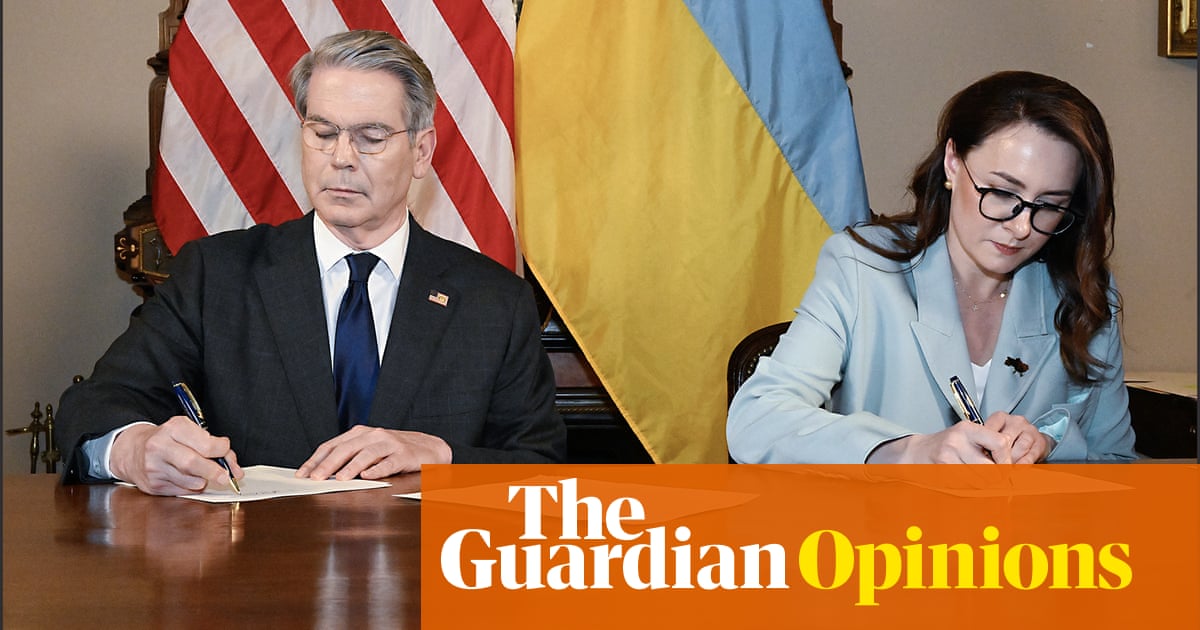The Trump administration, with its customary rhetorical inflation, has hailed itsmineral dealwith Ukraine as “historic”. What the world’s most powerful nation says and does matters. But how much? And for how long? This is a government of caprice and chaos – losing its national security adviser, Mike Waltz, on Thursday after only three months in the job. Attempting to connect the data points can be like trying to join up the bug splats on a windscreen. The real issue is that the vehicle is still following the signs for Moscow.
This moment looks like a high because US-Ukraine ties hit such a low, particularly with the Oval Office bullying of Volodymyr Zelenskyy and reports that Washington is willing to recognise annexed Crimea as Russian.Key details of this dealhave yet to be finalised in a technical agreement. The idea originated with Kyiv, which saw that economic incentives might be the only way to interest the money-minded US president in its defence. The Trump administration decided the answer was, in essence, to take all the resources without granting the security guarantee that Ukraine had sought. It looked a bit like a protection racket, without ongoing protection.
To reach a profit-sharing deal, therefore, is a success for Ukrainian diplomacy in very difficult circumstances and arguably the first positive sign in the bilateral relationship since Mr Trump took office. The textrefers to “Russia’s full-scale invasion” and “war machine”– the kind of language that the administration has not only avoided butactively rejectedelsewhere. (In February, Mr Trump said that Ukraine “should never have started it”.) Ukraine will not be retroactively repaying the US for its support. Kyiv has also said that for the first 10 years, profits will be “fully reinvested in Ukraine’s economy”, though this does not appear to be stated in the document.
But the agreement’s significance is limited. The presence of American citizens and businesses is not inherently protective: they were already in Ukraine when Vladimir Putin’s tanks rolled across the border in 2022. The agreement certainly does not show that Mr Trump wants toprolong US military aid– thoughreports saythat the administration plans to approve $50m of arms exports – still less offer a security backstop to a European presence. It does not signal that he is turning his back on Mr Putin, even if he is currently voicing irritation with him. And it does not mean that abigger economic dealwith Russia may not be in the pipeline.
Touting this agreement as evidence of his deal‑making prowess could encourage Mr Trump to feel a degree of political investment in the crisis, and perhaps therefore make Mr Putin step a little more carefully. But the Russian president may think he should seize more territory while he can. Mr Trump’s peace-making efforts to date have amounted to attempting to strong-armUkraineinto accepting Moscow’s terms because he thinks that any deal looks better than none.
At a time of such peril, even very limited gains will be welcomed and exploited. Mr Trump may be somewhat more inclined to allow military intelligence to keep flowing, or European nations to buy arms for Ukraine. In the worst case scenario, Kyiv has shored up the relationship for a short period, while European allies step up support. That is not nothing. But an administration which has so harshly demanded Ukraine’s gratitude has yet to give it anything deserving of thanks.
